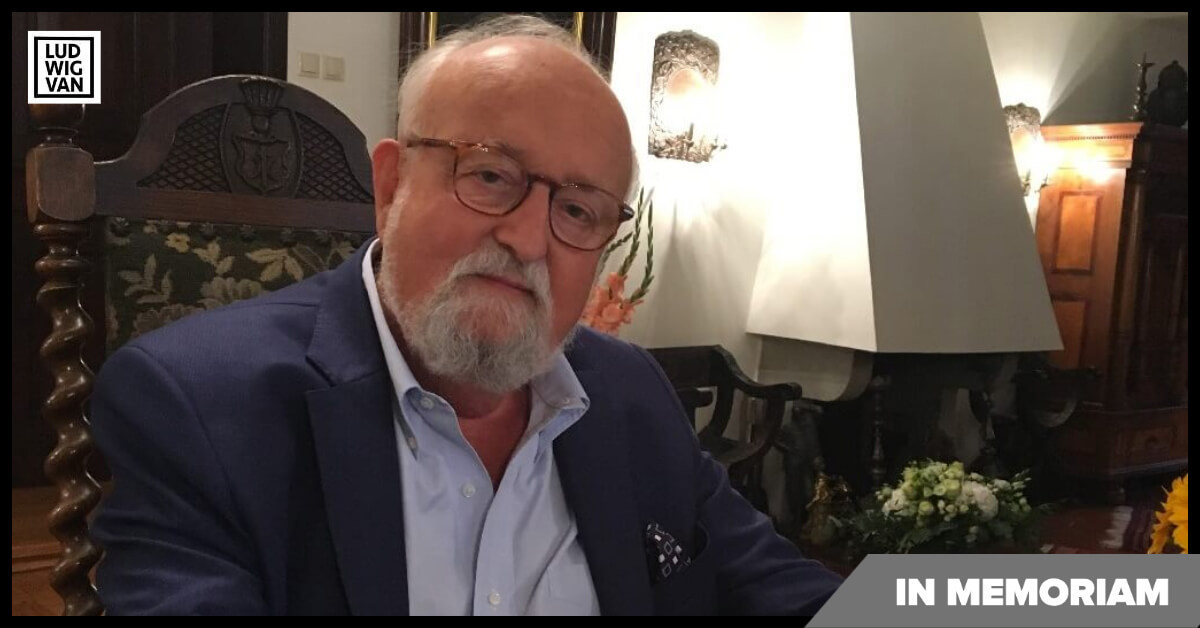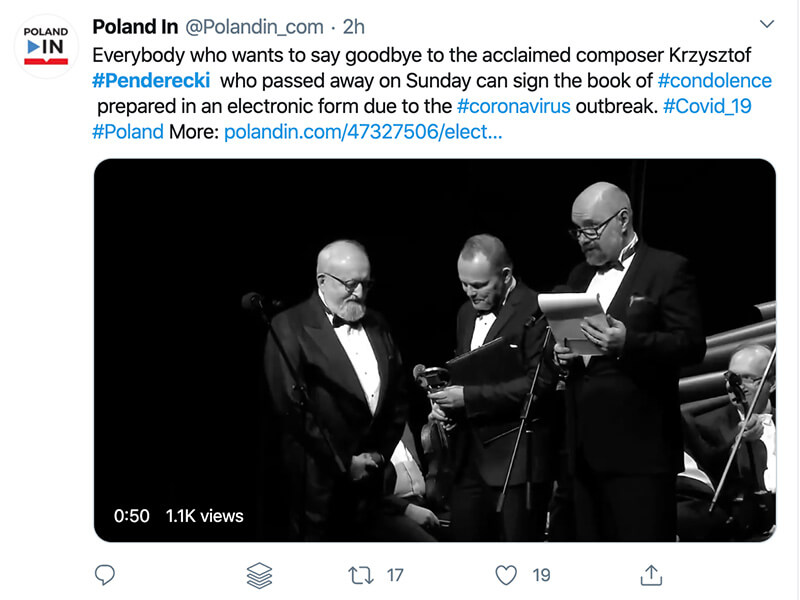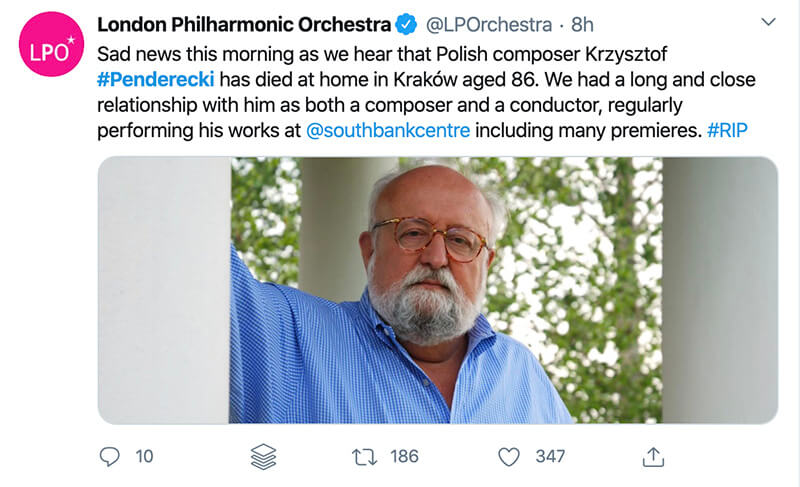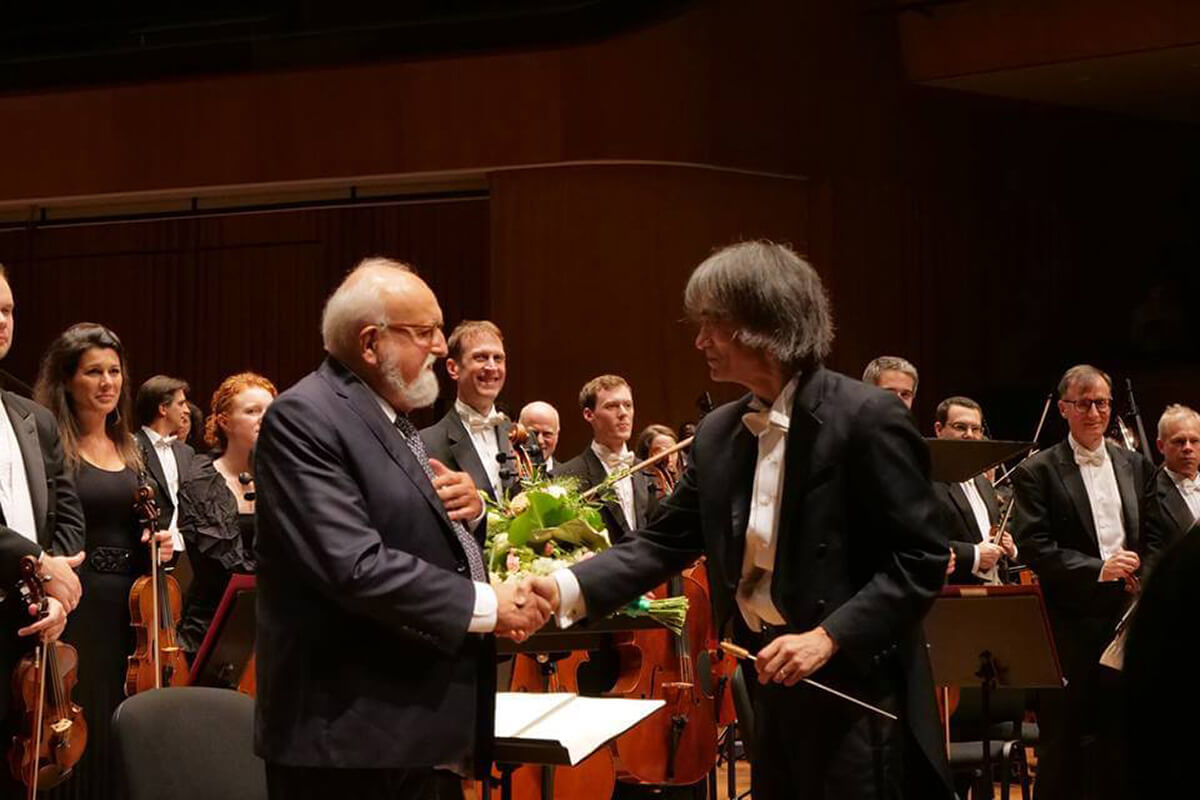Krzysztof Penderecki, one of the world’s most renowned composers, has died, leaving a legacy in his wake.

The classical music community is in mourning today as news of one of the world’s most important composers, Krzysztof Penderecki, has died.
The news broke in a tweet by Poland’s Ministry of Culture:
“After a long and serious illness, Krzysztof Penderecki – one of the greatest Polish musicians, a world authority in the field of classical music died,” Poland’s Ministry of Culture said in a tweet.


According to the composer’s daughter Beata Penderecka, Penderecki had been in quarantine after his caregiver tested positive for the coronavirus. Penderecki was tested, but results came back negative.
Penderecki was widely known not only as a composer for the concert stage, but also a film composer. Credits include William Friedkin’s “The Exorcist”, Stanley Kubrick’s “The Shining”, and David Lynch’s “Wild at Heart”.
His most notable work is his groundbreaking fork for orchestra, Threnody for the Victims of Hiroshima and St Luke’s Passion.
Penderecki leaves behind three children, and his Elżbieta Penderecka.
RIP
— — — — —
Ludwig Van’s Arthur Kaptainis interviewed Penderecki in July 2018. See below for the full interview:
KRAKOW – Krzysztof Penderecki could not say for sure which of his many works is the most performed. “This is a question for my publisher more than for me,” he commented in his spacious and traditionally appointed home on the outskirts of the second city of Poland.
Yet this most distinguished and discussed of living European composers is fairly confident that the Passio et mors Domini nostri Jesu Christi secundum Lucam — known in English as the St. Luke Passion and in French as the Passion selon saint Luc — numbers among the contenders.
“This was a piece that found audiences from the beginning,” Penderecki said of the 70-minute oratorio, which was first given in 1966 in the rebuilt cathedral of the German city of Münster.
As followers of the OSM are aware, the Passion found a new audience on July 14 at the Lanaudière Festival, where Kent Nagano led the OSM Chorus. On July 18 the conductor and orchestra were at it again in the ICE Congress Centre in Kraków, a curvy modern concert hall and conference complex overlooking a bend in the Vistula River.
Then on July 20 they took the piece to the Felsenreitschule Theatre in Salzburg as the official opening he immensely prestigious Salzburg Festival. Joining them in Kraków and Salzburg were four international soloists (including narrator) and the Kraków Philharmonic Choir and Warsaw Boys Choir. Expect a recording of the live performance of the Salzburg performance on the BIS label.
Penderecki was present in Kraków and Salzburg to accept his accolades beside Nagano and company. Not that he gets out to concerts all that often. “Every day I work on music,” he said. “I have not much time.”

I asked whether he used a piano to compose, no piano being visible among the oriental carpets, vintage books and historical canvases.
“I have an upright piano, small one, out of tune,” he said. “I’m actually not using it.”
Might this in part explain the absence of solo piano music from his otherwise variegated oeuvre?
“Of course, I love Chopin’s piano music,” Penderecki clarified. “But there is so much music written for piano. I am not going to write piano sonatas.”
Looking at least a decade younger than his 84 years, Penderecki remains industrious. With pencil and paper, mind you, software being entirely foreign to his psychology.
The day before the interview, he finished the Polonaise No. 2. It was a weekend’s work. Like the Polonaise of 2015, this is light music in a humorous vein.
Might we expect more gravitas from the Symphony No. 9?
“Good question,” he said. “Of course, I am going to write it. I have sketches, but I am not in a hurry. I want this piece to be an important piece. The Ninth Symphony is supposed to be something special.”
An hour in length?
“Forty minutes, something like that. I’m writing one big movement. I’m not sure if it will be with choir or not.
“I have sketches. I cannot say anything more. Absolutely different sketches, which I can put together, or maybe start from the beginning.”
We can probably expect something substantial. While Penderecki has produced his share of chamber works and concertos, he remains best known for big-format scores, often connected to a sacred text or resonant historical theme.
Twenty years ago, Montrealers heard him in Notre Dame Basilica leading the OSM through the Polish Requiem, inspired in part by the Katyn massacre of Polish officers in the Second World War. This harrowing 100-minute-plus opus of 1984 had its beginnings in a Lacrimosa dedicated to the victims of the 1980 workers’ uprising in Gdansk.
In 1996 Charles Dutoit led the OSM through the North American premiere (and, in Carnegie Hall, the American premiere) of the industrial-strength Symphony No. 3. In 2015 Penderecki was in Montreal to lead the OSM Chorus in the Canadian premiere of Psalm 3, a setting written as an observance of the centenary of the Armenian Genocide. The composer had a grandmother of Armenian descent.
The list of substantial statements could go on. The Symphony No. 7 (“Seven Gates of Jerusalem”) of 1997 was a celebration of the 3,000th anniversary of the city of the subtitle, the Symphony No. 8 of 2007, a sequence of settings of German poems.
The Dies Illa of 2014 – passages of which could be mistaken for Berlioz – reaffirmed the composer’s interest in large-scale sacred composition and firm dedication to the harmonic language of the past.
“I just wanted once to write an absolutely tonal work,” he explained.
The St. Luke Passion is cut from a different cloth. Glissandi are common in strings and voices, clusters are frequent in the organ and brass. Drummers bang manically. Choristers hiss, chatter, shout and howl almost as often as they sing.
Yet despite these strange sounds, or arguably because of them, the St. Luke Passion communicates directly to listeners in a way other experimental scores of its era do not. Its devotional nature was another oddity in 1966, when contemporary composers had abandoned religious subjects (and certainly received no encouragement from Communist authorities to praise the Almighty).
There are, to be sure, motifs and melodies in the Passion, and two 12-tone rows, one quoting B-A-C-H. The final chord is an E Major triad, which is harmonically prepared for, unlike the sudden C Major chord that ends the otherwise utterly atonal Polymorphia of 1961.
As far as Penderecki has come since his avant-garde period – of which the most famous product will always be the Threnody for Victims of Hiroshima of 1960 – he remains devoted to these early scores and comfortable with his decision to leave modernism in the modern sense behind.
“I couldn’t write all my life using the same musical language. I developed, and my music developed with me. It became maybe, we could say, more logical also.” – Krzysztof Penderecki
Certainly more accessible to people with tonal expectations. Bruckner, Mahler, Shostakovich and Sibelius are some of the sources critics detect, rightly or wrongly, in works from 1980 onward. Last April in Washington this writer heard the Indianapolis Symphony Orchestra perform Penderecki’s Credo of 1998. Mahler’s ghost made a few appearances.
Is Penderecki’s music, once so forward-looking, now too redolent of the past?
“You cannot write a piece that is not connected with something in history,” the composer responded. “This is impossible. You cannot write an absolutely original piece that never was heard or written down.”
Even the St. Luke Passion, for all its apparent audacity, has roots in Bach.
“This is my style. I am taking everything which was good in the history of music, everything I like, which was very important, many different systems also. »
His eclecticism might explain why he does not often attend concerts. “If I listen to something like Mahler, it stays in my ear for weeks,” he said. « I have to write my own music.”
Penderecki was willing to make an exception last week for a performance Verdi’s Aida at the outdoor Arena di Verona, which he attended with his wife Elżbieta, a glamourous woman who is almost as famous in Kraków as her husband for her entrepreneurial panache.
“This was something really great, to listen to Aida,” Penderecki said. “Sometime back, I thought this was banal. It is not banal. It is great music, deep music, moving.”
“The maestro and his wife are fond of Italy,” commented his assistant, who was present for much of the interview.
The past is fine, we all agree. What about the present? Are there living composers Penderecki admires? Does he have an opinion, for example, of John Adams?
“I heard some of his music, because we used to live in the States,” Penderecki said. “But this is not my cup of tea. »
“Actually, there are not now many good composers, I’m sorry to say. Twenty, 30, 40, 50 years ago, there were many still alive. But now?
“If you ask me about other composers, I’m not able even to say one name, which I would say, ‘This is a composer I admire.’
“I did admire in the past Stravinsky, Shostakovich and many, many [other] composers. Now, I think, ‘What happened to the composers?’”
[This interview was originally published in Ludwig van Montreal on July 21, 2018]
#LUDWIGVAN
Want more updates on classical music and opera news and reviews? Follow us on Facebook, Instagram or Twitter for all the latest.
- THE SCOOP | Royal Conservatory’s Dr. Peter Simon Awarded The Order Of Ontario - January 2, 2024
- THE SCOOP | Order of Canada Appointees Announced, Including Big Names From The Arts - December 29, 2023
- Ludwig Van Is Being Acquired By ZoomerMedia - June 12, 2023



